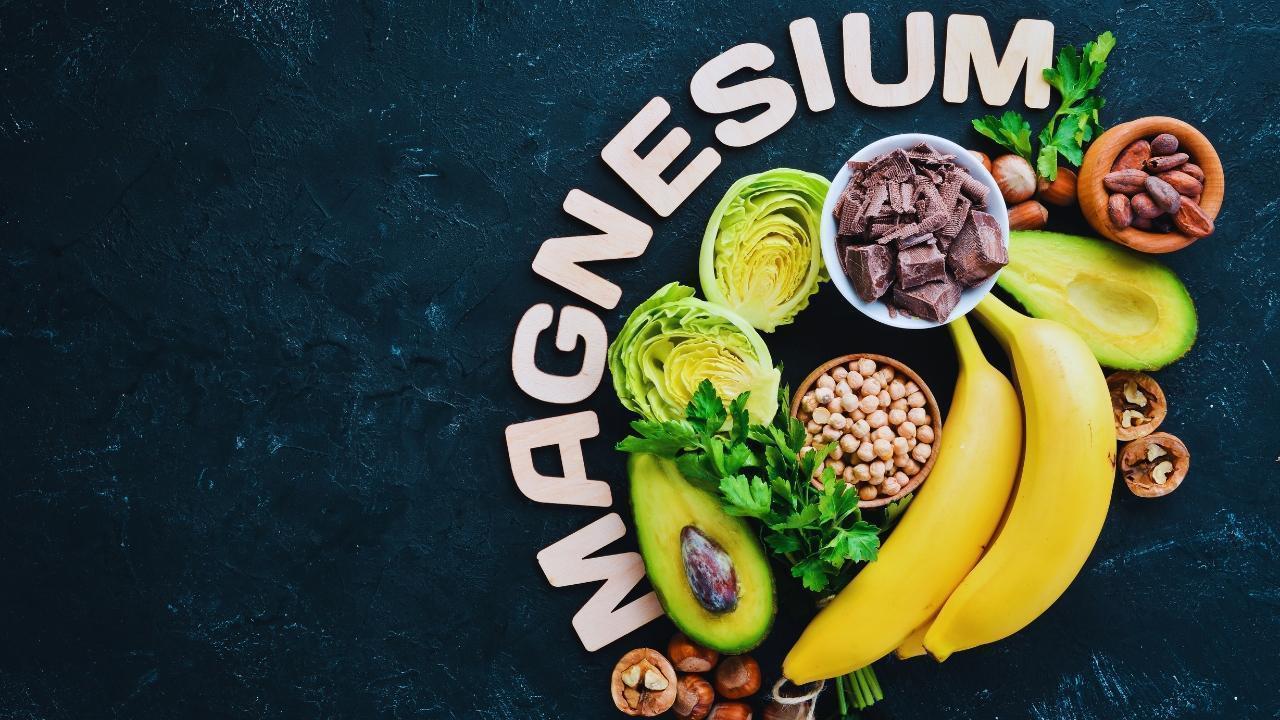You have not yet added any article to your bookmarks!

Join 10k+ people to get notified about new posts, news and tips.
Do not worry we don't spam!

Post by : Anis Farhan
Magnesium might sound like just another supplement in the wellness aisle, but it’s become a hot topic for good reason. From social media influencers to medical professionals, everyone seems to be singing its praises. But why? What’s so special about this humble mineral, and should you be paying closer attention to your magnesium levels? Let’s dig deeper into what’s sparking the magnesium mania and why it may matter more than you think.
Magnesium is an essential mineral involved in over 300 biochemical processes in the human body. It plays a vital role in muscle function, nerve health, blood sugar control, and bone development. Despite its importance, magnesium doesn’t get the spotlight as often as other nutrients like calcium or iron.
But here's the twist—magnesium isn’t just about preventing cramps or supporting your bones. Emerging research shows that it could impact everything from anxiety levels to heart disease risk. That’s one of the reasons this once-overlooked nutrient is now at the center of major health discussions worldwide.
A large portion of the global population, especially in urban environments, is estimated to be magnesium-deficient without even realizing it. Modern diets high in processed foods and low in green leafy vegetables, nuts, seeds, and whole grains contribute significantly to this deficiency.
People under chronic stress, those consuming too much caffeine or alcohol, and individuals with digestive disorders like IBS or Crohn's disease may be especially vulnerable to poor magnesium absorption. What makes this even more concerning is that magnesium deficiency often shows subtle signs—fatigue, irritability, sleep issues, or muscle twitching—that people commonly ignore or misattribute.
Walk into any wellness store or scroll through health influencer pages, and you’ll see a variety of magnesium products: capsules, powders, sprays, oils, and even bath flakes. Magnesium has become a wellness staple, particularly among those promoting stress relief, hormonal balance, and better sleep.
Its reputation has grown because it offers something that’s in high demand today—natural, non-pharmaceutical support for everyday issues. Whether it's “magnesium for PMS,” “magnesium to sleep,” or “magnesium to detox,” the messaging around this mineral is now infused with lifestyle appeal. The rise in popularity of holistic health approaches has only added to this trend.
Not all magnesium supplements are the same, and each type has unique benefits. Here's a breakdown of the most popular forms and what they’re commonly used for:
Magnesium Citrate: Known for its laxative effect, often used for digestive health.
Magnesium Glycinate: Commonly taken for anxiety and sleep issues due to its calming effect.
Magnesium Oxide: A more traditional, cost-effective option often used to relieve heartburn or constipation.
Magnesium Malate: Said to help with energy production and muscle pain, often favored by those with chronic fatigue.
Magnesium Threonate: Gaining attention for its possible brain benefits and cognitive support.
Magnesium Chloride: Frequently found in topical sprays or oils for muscle relaxation and skin absorption.
Understanding the differences can help consumers make informed choices rather than just jumping on the supplement bandwagon.
One of the biggest drivers of magnesium’s recent popularity is its link to mental well-being. Several studies suggest magnesium plays a critical role in mood regulation and the body's stress response. It acts as a natural NMDA receptor antagonist, helping to calm the nervous system and reduce overstimulation in the brain.
Magnesium deficiency has been linked to higher levels of anxiety, depression, and insomnia. On the flip side, supplementation may improve resilience to stress, reduce feelings of anxiety, and improve sleep quality in many individuals. These findings have made magnesium especially appealing to younger generations battling burnout, digital fatigue, and post-pandemic mental health struggles.
If you’ve had trouble sleeping lately, you’re not alone. Sleep disorders are on the rise globally, and magnesium might be part of the solution. It supports the regulation of neurotransmitters and hormones that promote relaxation, such as GABA and melatonin.
A growing number of people now swear by magnesium before bed. Some take magnesium glycinate capsules, while others prefer warm baths with magnesium-rich Epsom salts. Anecdotal stories and small-scale studies suggest that regular magnesium intake may lead to deeper, more restful sleep—without the side effects that often accompany pharmaceutical options.
The best way to get magnesium is still through a balanced diet. While supplements can help in specific situations, food-based sources offer added fiber, antioxidants, and a nutritional safety net that pills simply can’t provide.
Some magnesium-rich foods include:
Spinach and other leafy greens
Pumpkin seeds and sunflower seeds
Almonds and cashews
Black beans and chickpeas
Whole grains like brown rice and oats
Avocados
Dark chocolate
If you're eating a variety of whole foods, chances are you're getting some magnesium—but many people still fall short of the recommended 310–420 mg/day depending on age and gender.
While magnesium from food is generally safe, supplementation needs caution. High doses can lead to side effects like diarrhea, nausea, and even heart problems if taken excessively. That’s why it’s crucial to stick to dosage guidelines and consult a healthcare provider, especially for people with kidney issues or those taking medications that interact with magnesium.
More is not always better. The idea isn’t to megadose magnesium but to ensure your body has what it needs to function optimally.
Several cultural shifts have amplified magnesium’s relevance in recent years. These include:
The rise of biohacking culture: People are taking charge of their own health using data, supplements, and routines to feel and perform better. Magnesium fits neatly into this toolkit.
Increased focus on sleep and mental health: In a world where burnout is almost normalized, natural remedies like magnesium are gaining popularity as people look to restore balance.
Functional medicine’s mainstreaming: This approach looks at root causes rather than symptoms, and magnesium plays a key role in many physiological systems.
The supplement boom: Post-pandemic health consciousness and distrust in pharmaceutical solutions have pushed more people toward natural supplements.
Combined, these factors have created the perfect storm for magnesium to move from clinical obscurity to consumer stardom.
Magnesium supplementation isn't necessary for everyone, but it can be helpful for people experiencing:
Chronic stress or high cortisol levels
Insomnia or poor sleep
Anxiety or low mood
Frequent muscle cramps or twitches
Digestive issues
Hormonal imbalance or PMS symptoms
Athletes, older adults, and people with restrictive diets may also benefit from supplementing. But again, testing and professional guidance are key to ensuring it's the right choice for your body.
Magnesium might not be a miracle cure, but it’s certainly a mighty mineral with a lot of potential benefits. In an age where people are overwhelmed with health advice, it offers a refreshingly simple and research-backed solution. Whether you choose to boost your intake through food or supplements, paying attention to your magnesium levels could be a game-changer for your energy, mood, sleep, and overall wellness.
And unlike many trends that overpromise and underdeliver, magnesium’s benefits are grounded in decades of scientific understanding. So while it may have taken time to get the spotlight, its moment is well-deserved—and possibly long overdue.
This article is for informational purposes only and is not intended as medical advice. Always consult a qualified healthcare provider before starting any new supplement or health routine.










Ranveer Singh’s Dhurandhar Roars Past ₹1100 Cr Worldwide
Ranveer Singh’s Dhurandhar stays unstoppable in week four, crossing ₹1100 crore globally and overtak

Asian Stocks Surge as Dollar Dips, Silver Hits $80 Amid Rate Cut Hopes
Asian markets rally to six-week highs while silver breaks $80, driven by Federal Reserve rate cut ex

Balendra Shah Joins Rastriya Swatantra Party Ahead of Nepal Polls
Kathmandu Mayor Balendra Shah allies with Rastriya Swatantra Party, led by Rabi Lamichhane, to chall

Australia launches review of law enforcement after Bondi shooting
Australia begins an independent review of law enforcement actions and laws after the Bondi mass shoo

Akshaye Khanna exits Drishyam 3; Jaideep Ahlawat steps in fast
Producer confirms Jaideep Ahlawat replaces Akshaye Khanna in Drishyam 3 after actor’s sudden exit ov

Kapil Sharma’s Kis Kisko Pyaar Karoon 2 to Re-release in January 2026
After limited screens affected its run, Kapil Sharma’s comedy film Kis Kisko Pyaar Karoon 2 will ret